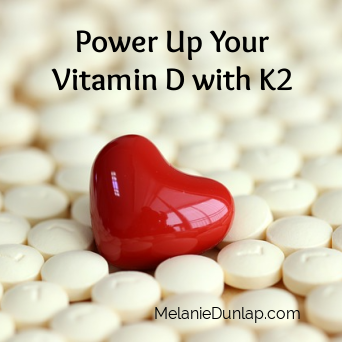Are you making the most of your vitamin D? Estimates suggest that as many as 52% of women are deficient.
Most health-conscious women are taking daily supplements and hopefully vitamin D is one of them. Inexpensive yet extremely powerful, this is a supplement that gives you a lot of bang for your buck.
It wasn’t until I was diagnosed with breast cancer the second time that I learned what else should be in my vitamin D to make it more effective at supporting my heart, bones and preventing cancer.
I’ll tell you about that in a minute.
Vitamin D is a fat-soluble vitamin that is naturally present in a few foods, added to others, and available as a dietary supplement. It is also produced by the body when ultraviolet (UV) rays from sunlight strike the skin.
Any vitamin D obtained from sun exposure, foods, or supplements must go through two conversions to activate it, one in the liver and one in the kidneys.
Two important things vitamin D does is to promote calcium absorption and support bone health. It has other roles in the body, like reducing inflammation and supporting cell growth, neuromuscular and immune function, and glucose metabolism
Vitamin D helps to slow cancers and their spread. The Canadian Cancer Society noted that science shows up to 60% reduced risk of some cancers with adequate vitamin D levels.
Vitamin D in Food
Most of the vitamin D found in the American diet comes from fortified foods. Meaning that it was added to the food. Almost all the US milk supply is fortified with vitamin D3. Other dairy products made from milk, such as cheese and ice cream are not usually fortified.
Plant milk alternatives, like oat, almond or soy are often fortified with similar amounts of vitamin D3 as cow’s milk. You can check the nutrition label to find out how much your product contains.
Ready-to-eat breakfast cereals often contain added vitamin D, as do some brands of orange juice, yogurt, margarine, and other food products.
The Sunshine Vitamin
You may have heard vitamin D referred to as the sunshine vitamin. That’s because the human body can convert sunlight into vitamin D.
Unfortunately getting vitamin D from sunlight isn’t always as easy as it sounds. Despite an abundance of sunshine, most of us are still deficient.
Things like the season, location, time of day, cloud cover, air quality, color of skin and use of sunscreen affect how much sun exposure we really get. Because there are so many variables in sun exposure, experts can’t give us good guidelines for getting vitamin D from sunlight.
The only real way to know your vitamin D levels is through bloodwork. A simple blood test tells us exactly how much we have in our body at the time of the test. Only with repeated testing can we monitor our levels and adjust our supplementation accordingly. Fortunately, it is one of the tests that you can order through patient ordered bloodwork.
But I promised to tell you how to make your vitamin D more effective…
When I was diagnosed with breast cancer for the second time I doubled down on my research. This time I came at it from a practitioner level, and I was pissed off.
One of my best finds was a book called “Naturopathic Oncology: An Encyclopedic Guide for Patients & Physicians” written by Dr. Neil McKinney, a Canadian naturopath.
It was that book that taught me how to make a simple vitamin D supplement more powerful and keep me from taking an additional pill.
Vitamin K2
That’s when I learned about the importance of vitamin K2.
Discovered in 1929, vitamin K is an essential nutrient needed for your blood to clot. It was originally called “Koagulationsvitamin”, that’s where the K came from.
Also a fat-soluble vitamin, there are two main forms of K. Vitamin K1 found in plant foods like leafy greens. The other is K2 found in animal products and fermented goods.
It is vitamin K2 that pairs with vitamin D to support our bone and heart health.
You may never have heard of K2 but it plays an important role in a number of body functions. It protects the heart, builds and maintains strong bones, has anti-cancer properties, enhances athletic performance, supports joint health, protects against dementia, reduces neuropathy in diabetics and helps the absorption of magnesium and vitamin D.
Bone Health
The most exciting thing to me is how vitamin K2 supports bone health.
For as long as I can remember women have been told to take calcium to keep our bones strong and prevent osteoporosis. Recent scientific evidence has shown that elevated consumption of calcium supplements can raise the risk for heart disease.
It turns out that the extra calcium sticks to the walls of our blood vessels causing blockages and stiffness in our arteries.
The cool thing about vitamin K2 is that it drives the calcium into the bone where it is needed. This lessens the amount of calcium floating around in our arteries and other tissues where it can do damage.
Based on my own health goals and history I choose to take a supplement that is D3 + K2-7. The seven stands for menaquinone, the form of K2.
I take Vital Nutrients K2-7 + D3. It is the same one I recommend to my wellness coaching clients when they need it. Click here to go to my online dispensary and learn more.
You should talk to your doctor or natural health practitioner before stopping or starting any supplements. Don’t quit taking calcium just because you read this! This is not medical advice, it’s information for you to use when making decisions about your own health and wellness.
